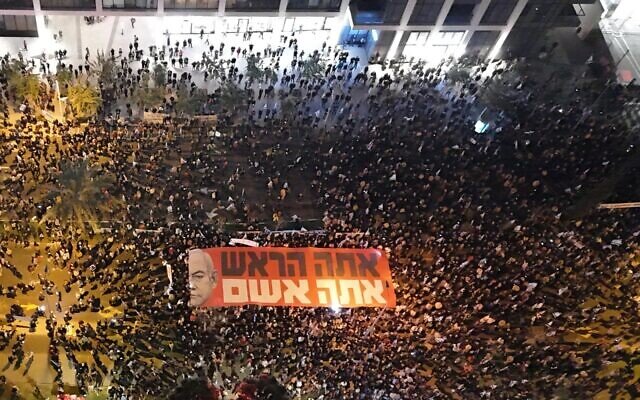Netanyahu narcissism
Israeli PM defies calls to resign, end Gaza war

TEHRAN- Divisions continue to grow in Israel over Prime Minister Benjamin Netanyahu’s handling of the war on Gaza.
Netanyahu has found himself in hot water over the fate of the captives that were taken after Hamas launched a successful military operation in southern Israel more than four months ago.
The resistance movement carried out “Operation Al-Aqsa Flood” in October last year. More than 1,100 were killed in the operation and around 250 others were taken captive.
More than 100 of the captives were freed as part of a weeklong truce between Israel and Hamas in late November that led to the release of hundreds of Palestinians from Israeli jails. Around 130 of the captives remain in Gaza, a fourth of them believed to be dead. They have lost their lives as a result of Israel’s relentless strikes against the besieged Palestinian territory.
Israelis have held anti-Netanyahu protests since the October 7 Hamas attack. They have filled the streets to vent their anger at the premier for his regime’s failure to anticipate and prevent the attack.
Most violent clashes
The protests have gradually increased in volume and intensity over the fate of captives held in Gaza peaking in clashes at the weekend.
On Saturday night, police used water cannons against protesters while clashing with them in Tel Aviv.
More than 20 people were arrested and several others were injured in the clashes that were the most violent of their kind since October 7.
In Tel Aviv, video from the protests showed a mounted officer using the reins of his horse to strike a protester across the head.
In a statement, Israeli police accused protesters of disturbing peace, saying they had “gathered illegally” in the streets.
“Unfortunately, today we saw a number of protesters who came with the purpose of confronting the police, and not for a legitimate protest,” the statement added.
The Israeli opposition leader reacted to police violence.
“The police violence this evening toward protesters, among them the families of hostages, is dangerous, antidemocratic, and cannot continue,” Yair Lapid said.
He added, “The right to protest is a fundamental right, and it cannot be taken from protesters with batons and water cannons.”
The protesters made several demands. They asked Netanyahu and his cabinet to resign.
The demonstrators also called for progress in talks for a captive agreement with Hamas and a diplomatic solution to the Israeli-Palestinian conflict.
The protesters further lashed out at far-right politicians such as Public Security Minister Itamar Ben Gvir and Finance Minister Bezalel Smotrich, who have said they will block a deal with Hamas that they feel would jeopardize Israel’s security or constitute a surrender to the resistance movement.
Some speakers accused Netanyahu of sabotaging the captives’ return to prolong the Gaza war to avoid elections.
Some other speakers also described the Netanyahu cabinet as a “criminal government” and “the most failed government in history”.
Former war minister Moshe Yaalon railed at Netanyahu for refusing to take responsibility for the October 7 attack.
But it seems growing protests do not matter to Netanyahu, who has been overwhelmed by narcissism.
The Netanyahu regime stands accused of committing genocide, war crimes, and crimes against humanity in Gaza, where nearly 30,000 Palestinians have been killed in Israeli air and ground strikes since October 7.
But in defiance of international calls to end massacres in Gaza, he seeks to prolong the war.
The continuation of the war can help Netanyahu evade accountability for the October 7 attack that dealt severe blows to his regime’s intelligence failure.
Prolonging the war also helped him get away with corruption charges that he faced before the October 7 attack.
As long as Western countries continue to provide Israel with military support, the Netanyahu regime will not end its campaign of genocide in Gaza.
